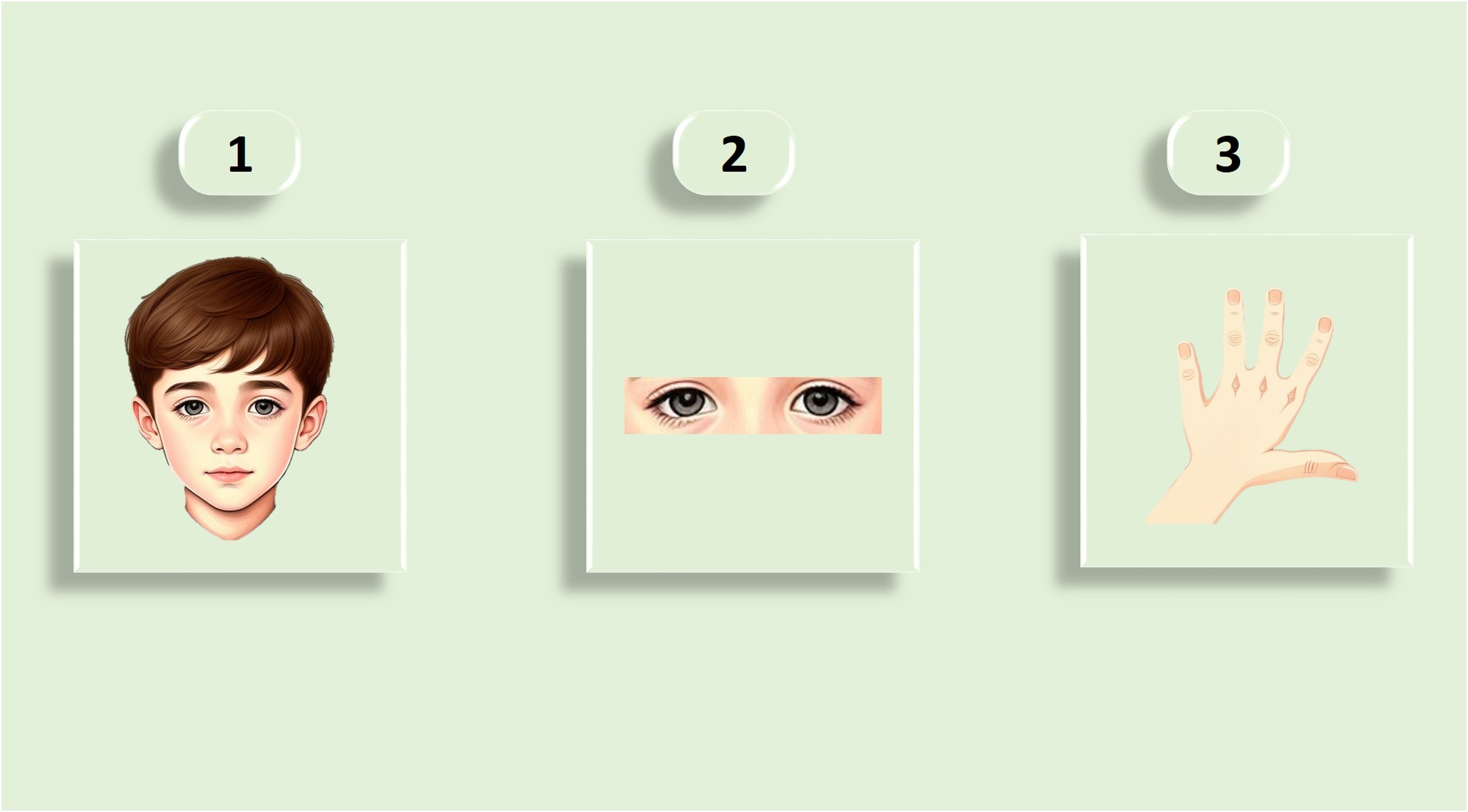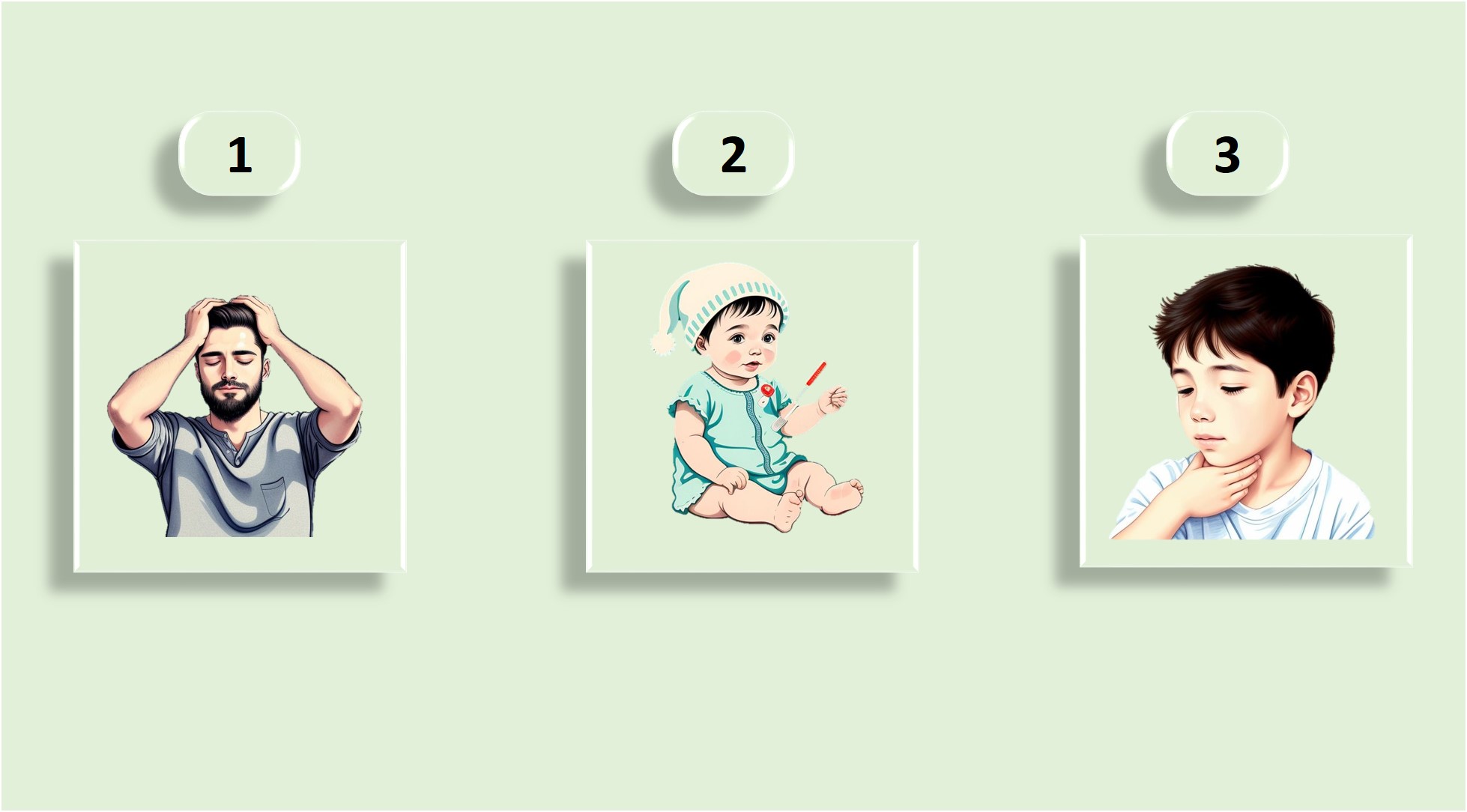Lesson 10
Title: Health and the Body
Subtitle: Lesson 10
Presented by: Fatima
Contact Information: blackboarder1@gmail.com
Welcome to our A1 English Course!
Today, we are going to talk about health and the body. We’ll learn vocabulary for different body parts, some basic health-related words, and how to talk about health.
Let's get started!
Objectives
• Learn vocabulary for body parts.
• Learn basic health vocabulary.
• Practice talking about health and how you feel.
• Learn basic health vocabulary.
• Practice talking about health and how you feel.
Body Parts Vocabulary
Let’s begin by learning the names of different parts of the body.
Knowing these words will help you describe how you feel and communicate with others.
Head:
The head is the top part of the body.
Eyes:
We use our eyes to see.
Ears:
We use our ears to hear.
Nose:
We use our nose to smell.
Mouth:
We use our mouth to eat and speak.
Hands:
We use our hands to hold things.
Arms:
Our arms connect our hands to our body.
Legs:
We use our legs to walk.
Feet:
Our feet are at the bottom of our legs.
Exercise:
Label the body parts in the diagram:

Knowing these words will help you describe how you feel and communicate with others.
Head:
The head is the top part of the body.
Eyes:
We use our eyes to see.
Ears:
We use our ears to hear.
Nose:
We use our nose to smell.
Mouth:
We use our mouth to eat and speak.
Hands:
We use our hands to hold things.
Arms:
Our arms connect our hands to our body.
Legs:
We use our legs to walk.
Feet:
Our feet are at the bottom of our legs.
Exercise:
Label the body parts in the diagram:

Basic Health Vocabulary
Now, let’s learn some basic words related to health.
These words will help you describe how you feel and talk about health problems.
Doctor:
A doctor helps you when you are sick.
Medicine:
Medicine helps you feel better.
Sick:
When you are sick, you don’t feel well.
Headache:
A headache is pain in your head.
Fever:
A fever is when your body temperature is high.
Cold:
A cold is a common illness with a runny nose and cough.
Cough:
A cough is when you have a tickle in your throat and you need to clear it.
Exercise:
Match the health word with the correct definition:
1: A person who helps you when you are sick.
2: Something you take to feel better.
3: When your body temperature is high.
These words will help you describe how you feel and talk about health problems.
Doctor:
A doctor helps you when you are sick.
Medicine:
Medicine helps you feel better.
Sick:
When you are sick, you don’t feel well.
Headache:
A headache is pain in your head.
Fever:
A fever is when your body temperature is high.
Cold:
A cold is a common illness with a runny nose and cough.
Cough:
A cough is when you have a tickle in your throat and you need to clear it.
Exercise:
Match the health word with the correct definition:
1: A person who helps you when you are sick.
2: Something you take to feel better.
3: When your body temperature is high.
Talking About Health
Now that we know some health-related vocabulary, let’s learn how to talk about health and how you feel.
How do you feel?
I feel sick.
What’s wrong?
I have a headache.
Do you need to see a doctor?
Yes, I need to see a doctor.
Take some medicine
Take some medicine if you have a cold.
Examples Dialogue:
Exercise:
Practice talking about health with a partner.
Use the vocabulary we learned.
Examples Dialogue:
How do you feel?
I feel sick.
What’s wrong?
I have a headache.
Do you need to see a doctor?
Yes, I need to see a doctor.
Take some medicine
Take some medicine if you have a cold.
Examples Dialogue:
A: How do you feel?
B: I don’t feel well. I have a fever.
A: You should see a doctor.
Exercise:
Practice talking about health with a partner.
Use the vocabulary we learned.
Examples Dialogue:
A: What's wrong?
B: I have a cold.
A: You should take some medicine.
Describing Symptoms
When you’re not feeling well, it’s important to describe your symptoms clearly so others can help you.
I have a headache:
My head hurts.
I have a fever:
I feel very hot.
I have a sore throat:
My throat hurts when I swallow.
I have a stomachache:
My stomach hurts.
I have a cough:
I can’t stop coughing.
Exercise:
Look at the pictures and describe the symptoms:

I have a headache:
My head hurts.
I have a fever:
I feel very hot.
I have a sore throat:
My throat hurts when I swallow.
I have a stomachache:
My stomach hurts.
I have a cough:
I can’t stop coughing.
Exercise:
Look at the pictures and describe the symptoms:

Visiting the Doctor
Let’s practice what to say when you visit the doctor.
This will help you explain your symptoms and understand the doctor’s advice.
Exercise:
Role-play a visit to the doctor with a partner.
One person is the doctor, and the other is the patient.
Example Dialogue:
This will help you explain your symptoms and understand the doctor’s advice.
Doctor: What seems to be the problem?
Patient: I have a fever and a cough.
Doctor: You should rest and drink plenty of water.
Patient: Thank you, doctor.
Exercise:
Role-play a visit to the doctor with a partner.
One person is the doctor, and the other is the patient.
Example Dialogue:
Doctor: What's wrong?
Patient: I have a sore throat and a headache.
Doctor: Take some medicine and rest.
Listening Practice
Let’s listen to a short conversation between a doctor and a patient.
Listen carefully and answer the questions after.
Exercise:
Answer these questions based on the listening:
1. What symptoms does the patient have?
2. What advice does the doctor give?
Listen carefully and answer the questions after.
Exercise:
Answer these questions based on the listening:
1. What symptoms does the patient have?
2. What advice does the doctor give?
Review and Practice
Let’s review what we learned today and do some practice exercises.
Complete the sentences with the correct word:
1. I have a ___ .
2. The doctor says I need to take ___ .
3. My head hurts. I have a ___ .
Complete the sentences with the correct word:
1. I have a ___ .
2. The doctor says I need to take ___ .
3. My head hurts. I have a ___ .
Homework
Great job today!
For homework, write a short paragraph about a time when you were sick.
Describe how you felt, what symptoms you had, and what you did to feel better. Practice reading it aloud.
Example:
Last month, I had a cold. I had a sore throat and a cough. I took some medicine and rested at home. After a few days, I felt better.
For homework, write a short paragraph about a time when you were sick.
Describe how you felt, what symptoms you had, and what you did to feel better. Practice reading it aloud.
Example:
Last month, I had a cold. I had a sore throat and a cough. I took some medicine and rested at home. After a few days, I felt better.
Thank you for your participation today!